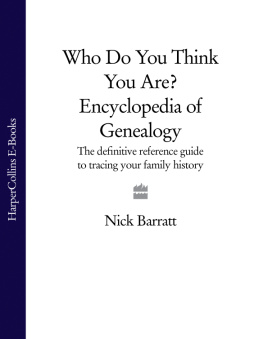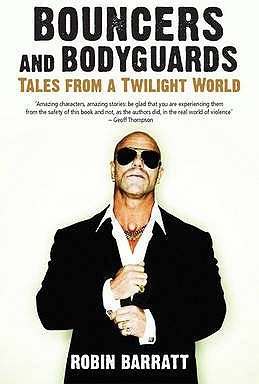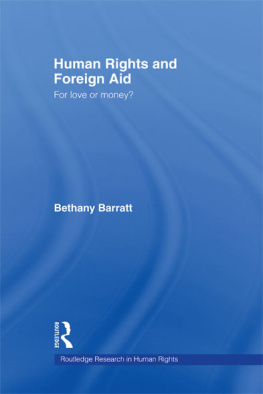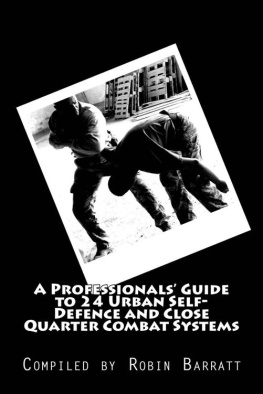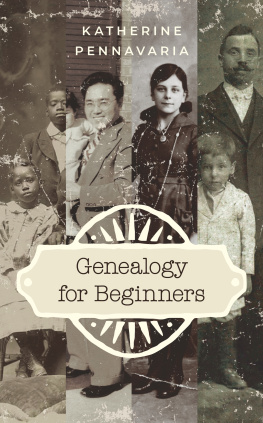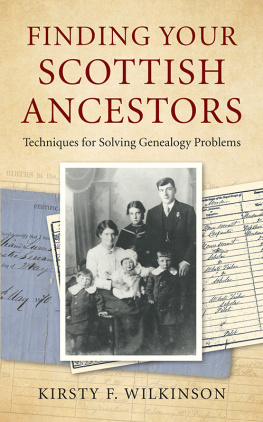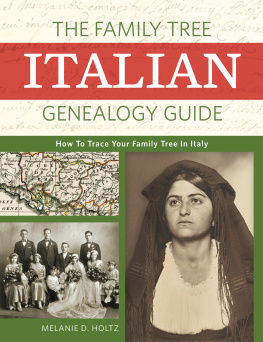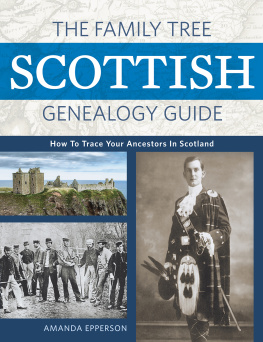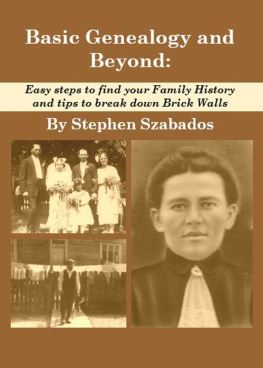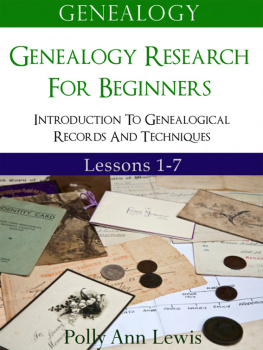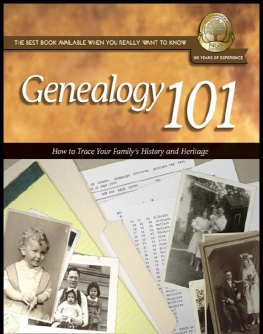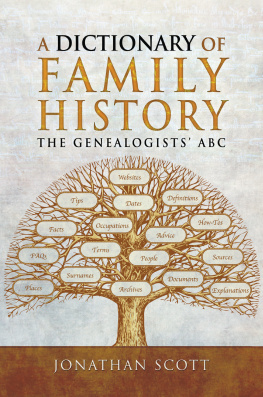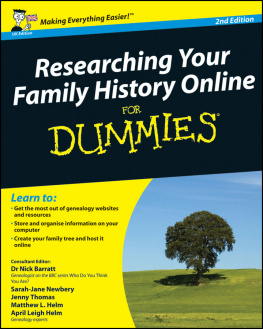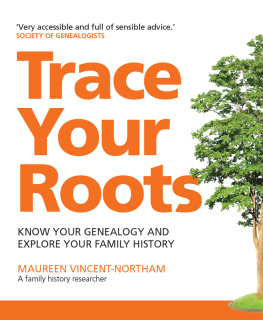
To Erica Doreen Miller, 19112007
Congratulations. By picking up this book, you have just taken your first step on a unique journey into your past, one that will gradually reveal lost generations of your family that you never knew existed; their place in history; and the path that has led you to stand here today, reading this. Thousands of others have started a similar voyage of discovery in recent years, each on a personal mission to reveal who their ancestors were, and what their lives were like.
One of the driving forces behind this phenomenon is the hit BBC TV show Who Do You Think You Are?, where every week a celebrity investigates their ancestral roots. Essentially a social history of Britain and its wider role in the world, the programme has stimulated millions of people to challenge their memories from school that history was a dull, academic subject and explore the past from a fresh perspective that of their own relatives, rather than the politicians, generals and royals that tend to populate our textbooks. As a result, history becomes real, living and relevant; its a personal journey into the past, with your own relatives as the tour guides. Events that you might once have read about in a textbook suddenly take on a new meaning once you realize that your ancestors were there as eye witnesses or even participants. The most exciting thing of all is that everyone can trace their family tree its not the exclusive preserve of those with privileged blood lines or aristocratic roots, but something that each and every one of us can do.
So why start looking into your familys history? Traditionally the press have given genealogy a rather negative image. Indeed, one commentator was moved to write that family history was self-indulgent navel gazing. What utter nonsense! There are so many reasons why it is important to look into your familys background, leaving aside the sheer joy of discovery that makes it such an addictive pastime. Perhaps the most important reason for starting is that you are going to discover more about yourself and your family, and gain a real understanding about where you have come from, who the main people were that shaped the fortunes of your family, and how small decisions in the past have had a knock-on effect over the years. In essence, every one of us is the living embodiment of the strands of personal history woven by our ancestors, all of whom contributed in some way to making us who we are today. In turn, their struggles to survive in a variety of changing conditions allow us to gaze into wider British social history, and ask questions about how we fit in. What was our class or cultural background? How did we fare in some of the great social upheavals in the past, such as the Industrial Revolution? Each generation faced a new challenge, and you can revisit these moments in time through your investigations.
Every one of us is the living embodiment of the strands of personal history woven by our ancestors.
There is another important reason to set out on this voyage of discovery, namely to preserve these links with the past, which once broken are very difficult to repair. This is why, as you will see, you should always talk to your elderly relatives and record their stories, anecdotes and knowledge. It is a sad fact of life that we often take an interest in our past when it is no longer possible to talk to those who played such an important part in shaping it. Yet it is not just about preserving the past; by looking into your familys background, you will be creating a legacy that can be passed on to future generations children, grandchildren and those still to come. This is especially important in the digital age, when we are no longer creating the treasured artefacts that we now look for and preserve as keepsakes from years gone by photographs, letters and postcards. Our means of communication email, text, mobile phone are instantly disposable unless we take active steps to preserve them, so it is just as important to record our thoughts and feelings now, or future generations wont have the material to hand to understand us, or the people that made us who we are.
However, there are several myths about family history that you might have heard, and these need to be explained briefly. One misconception is that it is all about building a family tree as far back as possible. Whilst it is important to name ancestors and place them in history, the family tree is simply a map of your roots, showing you how your ancestors are related to one another. The real purpose of family history is to bring these names back to life by researching where they lived, what jobs they did, how their community changed over time, and the ways in which their lives were touched by local and national events. In many ways, the phrase family history has rather outlived its use; instead, we should be thinking of personal heritage, as youll be creating a far richer, brighter and more interesting picture of your ancestors than a list of names on a page.
The second myth that needs dispelling is that family history can be done quickly via the Internet, and that all you have to do to track down your distant ancestors is log on, subscribe to a few websites, and youll have a family tree ready within hours. Sadly, this is completely untrue and misses the entire point of starting in the first place! As you will discover, there are certainly plenty of websites that will help you get started and the datasets and databases that they contain continue to grow almost daily and you will be able to achieve an amazing amount before you have to consider heading into an archive or museum. By putting the basic sources online, such as indexes to birth, marriage and death records, census returns and some wills, the process of constructing an initial family tree has been revolutionized. However, the Internet only provides a fraction of the resources youll need to flesh out the bones of your family tree and as indicated above bring your ancestors to life as real people who faced real challenges. This is where this book takes over, and leads you into the world of Britains archives, where there are original documents often dating back centuries that contain details of your ancestors lives, or were even written by them.
The aim of this book is to provide you with the relevant guidance, advice, information and inspiration to start out on this journey with confidence and realistic expectations. For the first time, a practical step-by-step tutorial for the beginner is combined with an overview of the basic sources youll need to get started, as well as the most comprehensive guide to the main family history topics that youll encounter as you progress: the brave men and women who took up the call to arms and served their country in one of the branches of the military; those who left the land and found work in a factory, ironworks or coal mine and therefore became the lifeblood of Britains industrial success on a world stage; the hopeful new arrivals coming to Britain to start a new life, at the same time as thousands more left these shores to emigrate to foreign lands that were brought into the orbit of the British Empire; or even those family secrets and hardships that our ancestors sought to hide from us. Furthermore, each section incorporates an overview of the social history behind the topic and surviving records that youll need to consult to track down your ancestors. Every chapter is illustrated with case studies from celebrities in the show, who have unearthed some amazing stories during their investigations. There are also two reference sections that offer practical research tips for the most common lines of enquiry; the meaning behind the top surnames and occupations you are likely to encounter; and detailed guides to the main archives in the UK and Ireland that you will have to visit to dig for information.
Next page
